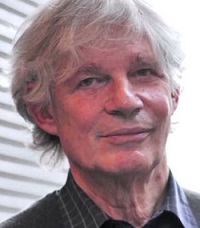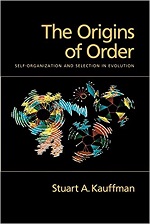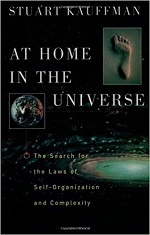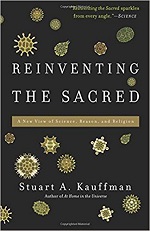|
TRANSLATE THIS ARTICLE
Integral World: Exploring Theories of Everything
An independent forum for a critical discussion of the integral philosophy of Ken Wilber
  Frank Visser, graduated as a psychologist of culture and religion, founded IntegralWorld in 1997. He worked as production manager for various publishing houses and as service manager for various internet companies and lives in Amsterdam. Books: Ken Wilber: Thought as Passion (SUNY, 2003), and The Corona Conspiracy: Combatting Disinformation about the Coronavirus (Kindle, 2020). Frank Visser, graduated as a psychologist of culture and religion, founded IntegralWorld in 1997. He worked as production manager for various publishing houses and as service manager for various internet companies and lives in Amsterdam. Books: Ken Wilber: Thought as Passion (SUNY, 2003), and The Corona Conspiracy: Combatting Disinformation about the Coronavirus (Kindle, 2020). Is Stuart Kauffman Really Ken Wilber's Ally?Frank VisserIn recent and past communications Ken Wilber has shown the following casual type of reasoning: there is a spiritual drive towards complexity in the universe, which I have called "Eros" ("by any other name"), and this view is corroborated by the work of several famous complexity scientists or philosophers. For example, Wilber assures us, in no uncertain terms, these authors mean "exactly the same" thing:
When a naturalist cause has been established for a given phenomenon, a spiritual explanation becomes obsolete.
The extent to which these authors would support Wilbers spiritual take on the universe is a matter of debate. Each of them deserves a separate essay in this regard. I have dealt with Prigogine and Whitehead recently, so I'd like to focus on Kauffman here. Most subscribe to a "creative universe", but that can mean many things. The fact that complexity has emerged in the universe is not disputed. What is disputed is the explanation we want to give for this emergence. What actually drives the universe and evolution? Does it matter? Is it not enough to point out some similarities between integral philosophy and recent developments in science? In my opinion it does matter. Positions can be divided into naturalist and eternalist ones, to use terms introduced by John Clarke.[1] Wilber and Whitehead are decidedly eternalist, whereas Prigogine and Kauffman are decidedly naturalist. I wouldn't know about Erich Jantsch. The point is that when a naturalist cause has been established for a give phenomenon, a spiritual explanation becomes obsolete.Think: Darwin. One could counter that a creative drive in the universe could be called naturalist or eternalist, depending on one's own preference. Many modern theologians see the processes of nature, especially in biological evolution, as the way God works. From the other side, some scientists see no problem to rephrase religion or sacredness as a matter of being in awe for the expanse of the physical cosmos. Think: Einstein. So the dividing lines are blurring, and this definitely doesn't help clear communication. But it is one thing to see one's favorite God as active in nature, or to call the processes of nature itself divine. INTRODUCING STUART KAUFFMANLet's take Stuart Kauffman as an example or exploring how Wilber uses scientific sources to bolster his spiritual view of the universe. Kauffman (b. 1939) is a theoretical biologist or systems biologist who has studied the origin of life problem, but he has touched on many other topics, such as the mind-body problem. His book titles show the scope of his investigations (from Wikipedia):
 Stuart Kauffman (b. 1939): “God is the creativity of the universe.“ "Kauffman is best known for arguing that the complexity of biological systems and organisms might result as much from self-organization and far-from-equilibrium dynamics as from Darwinian natural selection." (Wikipedia). This is the most relevant aspect of his work in relation to Wilber. Kauffman has criticized the notion that life originated due to a slow Darwinian process of chance and selection. Instead: he sees life as a natural result of certain collective complex molecular processes ("autocatalytic", self-sustaining). Life, therefore, is not a rare phenomenon at all, in his opinion, but something "to be expected". This is a very specific scientific hypothesis, even if not widely accepted. Here are some quotes from his works to give you a feel for his vision. Says Kauffman in the Preface to At Home in the Universe (1995): Thirty years of research have convinced me that this dominant view of biology [natural selection creates all biological complexity] is incomplete. As I will argue in this book, natural selection is important, but it has not labored alone to craft the fine architecture of the biosphere, from cell to organism to ecosystem. Another source—self-organization—is the root source of order. The order of the biological world, I have come to believe, is not merely tinkered, but arises naturally and spontaneously because of these principles of self-organization—laws of complexity that we are just beginning to uncover and understand. (p. vii-viii) And, very relevant for us, he stresses the point that this has nothing to do with mysticism: This theory of life's origins is rooted in an unrepentent holism, born not of mysticism, but of mathematical necessity.... Most important of all, if this is true, life is vastly more probable than we have supposed. Not only are we at home in the universe, but we are far more likely to share it with as yet unknown companions. (p. 69) So Stuart Kauffman opposes reductionism, atomism and materialism in favor of holism—an "unrepententent holism" at that. Wilber would call this "subtle reductionism". His Edge.org piece "Beyond Reductionism" summarizes his views.[2] For Kauffman the creativity of the universe is intrinsic. Keep that in mind for now. KAUFFMAN ON RELIGIONKauffman is a secular humanist, but contrary to regular atheist scientists, Kauffman's stance towards religion is positive—though he does reframe religion in his own way: Says the back cover of Kauffman's Reinventing the Sacred (2008): Consider the woven integrated complexity of a living cell after 3.8 billion years of evolution. Is it more awesome to suppose that a transcendent God fashioned the cell at a stroke, or to recognize the truth: that the living organism arose by no Creator, but was created by the evolving biosphere? In Reinventing the Sacred eminent complexity scientist Stuart Kauffman proposes a new understanding of a natural divinity based on an emerging, scientifically based worldview. This term "natural divinity" is the key here. Kauffman doesn't propose a return to any metaphysical religion, but the invention of a modern type of "religion". This is mostly a strategic choice, as he said in an interview with Salon, published with the telling title "God enough": I also feel parts of the religious person's sense of awe. I sense the solace that prayer to a transcendent God brings. But I don't believe in a transcendent God. I do believe in this new scientific worldview. I'm saying God is the sacredness of nature. And you can go a step beyond that. You can say that God is nature. That's the God of Spinoza. That's the God that Einstein believed in. But their view of the universe was deterministic. The new view is that evolution of the universe is partially lawless and ceaselessly creative. We are the children of that creativity. Fiercely attacking religion as Richard Dawkins is fond of doing, especially in his best-selling The God Delusion, doesn't seem particularly effective to Kauffman to bridge the gap between believers and non-believers. Even though he calls The God Delusion "a very good book" in this interview, Kauffman disagrees about this negative strategy: I think Richard is wrong. Not that there's a supernatural god. I think that there's something else. I think the creativity in nature is so stunning and so overwhelming that it's God enough for me, and I think it's God enough for many of us if we think about it. You see, Richard's view, and those of the new atheists, is simply not going to reach out and persuade those who hold to the standard Abrahamic religious views to consider something else. Whereas I hope what I'm saying may help create a new kind of sacred space.[3] One wonders, of course, if a "natural religion" would convert the fundamentalist Christian to "something else". But it is a serious alternative, more religion-positive strategy, to consider. In fact, it is Dawkins' religion as well: nature is awe-inspiring enough without any Divine creator. Introducing a Creator just complicates things, for who created this Creator in the first place?[4]   
Kauffman: “...the truth as best we know it, that all arose with no Creator agent, all on its wondrous own, is so awesome and stunning that it is God enough for me...”
WILBERS READING OF KAUFFMAN
Stuart Kauffman's understanding of self-organization is different from Wilber's—if Wilber has any precise understanding of it at all.
Given Kauffman critical remarks towards neo-Darwinism, there seems to be a natural affinity with Wilber. Wilber too, has criticized neo-Darwinism on several occasions. He often calls on Kauffman for support: I am not alone is seeing that chance and natural selection by themselves are not enough to account for the emergence that we see in evolution. Stuart Kaufman and many others have criticized mere chance and natural selection as not adequate to account for this emergence (he sees the necessity of adding self-organization). [5] This is very disingenuous, for Wilber doesn't offer a plausible and empirically verifiable alternative or supplement to neo-Darwinism. Kauffman, however, is very specific under which conditions he sees self-organization at work. Wilber, like any other theological evolutionist, can't offer that type of specificity, because his view is essentially religious. But who cares, Wilber seems to think, the enemy of my enemy (neo-Darwinism) is my friend. Still, Wilber speaks as if this is a minor detail: Kauffman has exposed the shortcomings of neo-Darwinism and pointed to the role played by self-organization, and self-organization is essentially a spiritual process, even if complexity scientists are unable to see or acknowledge this, given their scientific mind-set. However, this does not follow at all. Self-organization happens in many different circumstances and is a fascinating phenomenon (or actually many different phenomena), but is no proof in itself of any spiritual background. Nor would introducing Spirit offer any explanation of the processes under investigation. So yes, neo-Darwinism can be supplemented by any number of naturalistic forms of research, but that in itself offers no proof of Spirit. And yet, Wilber keeps repeating his slogans that "Evolution is Spirit-in-action" or that "There is ample room for a Kosmos of Eros", suggesting or implying that even complexity scientists or Nobel Prize winners are on board. Stuart Kauffman's understanding of self-organization is different from Wilber's—if Wilber has any precise understanding of it at all. For postulating a drive towards self-organization doesn't exactly clarify the process. Nor does it help to wildly generalize this "drive" to such diverse domains as cosmos, nature and culture. By giving a naturalist analysis of self-organization (is there any other?) Kauffman not only doesn't support Wilbers version—but effectively destroys it, or at least makes it obsolete. Kauffman belongs to a different universe, perhaps less magnificent than that of spirituality, but with a better understanding of what's actually going on in that universe. Such is "the magic of reality" (Dawkins) INTEGRALIAN DOUBLESPEAKIn a recent video Wilber (again) telegraphically referred to Kauffman as offering support to his view of Eros as the driving force in the Kosmos: I am always getting criticized by extremely conventional evolutionary theorists, like Frank Visser, because I postulate Eros, an inherent novelty in the cosmos... which by the way is Whiteheads point, the 'creative advance into novelty'. Eros... Stuart Kauffman, self-organization is built into the universe. Eros... Ilya Prigogine, a Nobel prize winner. 'Order out of chaos'. Even insentient matter, when pushed far from equilibrium, jumps into higher levels of order. Eros... [6] This is in flat contradiction to a statement he made a decade earlier (in response to requests for clarification about how exactly complexity science or evolutionary theory is actually supporting—or not supporting—his integral vision): Do I think Mayr or Dawkins or Lewontin or Kauffman believe in telos or Eros that is Spiritual in any way? Absolutely not. Virtually all mainstream theorists embrace scientific materialism.[7] So what is it, Ken? Do you think Kauffman et al. support your vision, or "absolutely not"? Notice the strange emotionalism in all these statements. For reasons unknown to me Wilber can't reason about this issue with any equanimity of mind. Integral pundits would add that no, of course, complexity science doesn't directly support a spiritual view of evolution, because it represents a "3rd person view" of reality. In this view, Spirit is active in the world under three Persons or Faces. Here's a typical integral meditation instruction: Begin by anchoring yourself in your 3rd-person awareness of the Ultimate. Become aware of Spirit as it manifests in the universe as “It.” Introduce into your awareness the word or phrase you have chosen to invoke and express Spirit in 3rd-person.[8] Alternatively, Spirit manifests as 2nd Person as the Great Other, or as 1st Person as the Self of all beings. But wait... Would Kauffman agree with this assessment? Does self-organization as studied in complexity science match Wilber's view of Spirit as it manifests in the universe as “It.”? Or would it be rather a case of complexity science finding a naturalistic cause for supposedly spiritual phenomena? For Kauffman, the creativity of the universe is intrinsic. For Wilber, it is "immanent Spirit". As he stated, again only when pressed to clarify his position regarding evolution and Spirit: You either postulate a supernatural source of which there are two types. One is a Platonic given and one is basically theological—a God or intelligent design—or you postulate Spirit as immanent—of course it's transcendent but also immanent—and it shows up as a self-organizing, self-transcending drive within evolution itself. And then evolution is Spirit's own unfolding. Not in super-natural, but an intra-natural, an immanently natural aspect. And that's basically the position I maintain.[9] But this is a sleight-of-hand. Naturalist would not accept an "immanent Spirit" acting in nature, for that is a metaphysical concept, however much disguised as "intra-natural" or "immanently natural". No, this is theology plain and simple. KEN WILBER'S ‘CREATIVISM’Years ago, in an essay on "Ken Wilber's Creativism" I mentioned the work of Arthur Peacocke, an Anglican priest who believed in theistic evolution: God is the Immanent Creator creating in and through the processes of natural order. Evolution is the continuous action of God in the world. All "the processes revealed by the sciences, especially evolutionary biology, are in themselves God-acting-as-Creator".[10] Peacocke is more honest about the fact that this is theology, not science. To distinguish Wilbers views from the fundamentalist creationism, we might call it "creativism".[11] And yet, Wilber keeps mentioning Kauffman as an ally to his spiritual view of the universe. This is intellectually dishonest. In my opinion, Wilber has co-opted terms from complexity science to bolster his own position. Like he has adopted an evolutionary terminology without knowing the first thing about evolution. Now of course, one could say, complexity science can't see Spirit because of its third person perspective, but that doesn't mean Spirit doesn't exist. But that is a two-edged sword: neither does complexity science say Spirit does exist. I am not splitting hairs here. If naturalistic science finds the real causes behind complexity, it would NOT support any spiritual view of it at the same time. Unless one wants to retreat to the very weak position that whatever happens in nature, it's God himself doing it. For example, would Spirit's involvement in the natural world also involve tsunami's, thunderstorms or earthquakes? Again, we are never told. But Wilber keeps believing in a "pressure", a "force" or a "push" towards higher stages of complexity and consciousness: The universe is slightly tilted toward self-organizing processes, and these processes—as Prigogine was the first to elaborate—escape present-level turmoil by jumping to higher levels of self-organization, and I see that "pressure" as operating throughout the physiosphere, the biosphere, and the noosphere. And there's the catch: an "intrinsic" force of self-organization is a fuzzy concept: for Wilber it is Spirit-in-action, for complexity scientists it isn't. Isn't the whole point of terms like "self-organizing", "self-creating", "self-transcending", etc. that these processes happen without an external agent? (Though even that is disputed by some complexity scientists: energy flows seem crucial to generate any complexity). As Jantsch put it, evolution is “self-transcendence through self-organization.” This is exactly the point Prigogine was making with dissipative structures, and exactly the point I am making when referring to wings or eyes: they are metaphors and examples for this extraordinary capacity of creative emergence that is intrinsic to the universe (exactly as Whitehead explained it). So, no, I don’t take this criticism of my work seriously.[13] "Exactly the point Prigogine was making"? "Exactly the point I am making"? "Exactly as Whitehead explained it?". Prigogine wasn't talking metaphors. Kauffman isn't talking metaphors. They are scientists who specify under what specific conditions certain phenomena will happen—or not happen. I hope you can see by now this glosses over fundamental differences in outlook, between naturalists and eternalists/theologians. But my point lies in a different direction, which is what these critics miss: the necessity of a self-organizing force (or Eros) intrinsic to the universe.[14] Summing up: self-organization itself is not disputed. It is the explanation Wilber proposes to explain for the phenomena of self-organization (and evolution) that is doubtful. Especially when he hooks it up to esoteric spirit-mythology of involution. Wilber is a mystical eternalist, who desperately tries to get naturalists on board.[15] But you can't claim support from authors who don't share your views. NOTES[1] John Clarke, "The Self-Creative Universe", www.integralworld.net, October 2018. [2] Stuart A. Kauffman, "Beyond Reductionism", edge.org,11.12.06 [3] Steve Paulson, "God Enough", www.salon.com, Nov. 19, 2008. [4] For a critical look ("religious thermodynamics") at Kauffman's ideas see the "Stuart Kauffman" entry of Hmolpedia, Encyclopedia of Human Thermodynamics, Human Chemistry, and Human Physics, www.eoht.info [5] Ken Wilber, "Re: Some Criticisms of My Understanding of Evolution", www.kenwilber.com, December 04, 2007. [6] Ken Wilber and Corey de Vos, "How to Think Integrally", www.integrallife.com, September 19, 2018. [7] Ken Wilber, "Take the Visser Site as Alternatives to KW, But Never as the Views of KW", www.kenwilber.com, June 27, 2006. [8] Diane Musho Hamilton, "The Three Faces of Spirit", www.integrallife.com, April 15, 2006. But see also: Chris Dierkes, "The Three Faces of God for Atheists", beamsandstruts.com, 2013, who writes: "Awe and wonder are certainly spiritual virtues that atheists can (and do) express in their lives." [9] Audio file linked from the PDF "Ken Responds to Recent Critics", posted under "Criticism/Appreciation", www.kenwilber.com, 2006. [10] Frank Visser, "Ken Wilber's 'Creativism'", www.integralworld.net, [11] Incidentally, Whitehead's philosophy has been called "pan-creativism". See: Michel Weber, Whitehead's Pancreativism: Jamesian Applications (Process Thought), Ontos Verlag, 2013. [12] Ken Wilber, "Re: Some Criticisms of My Understanding of Evolution", www.kenwilber.com, December 04, 2007. [13] Ibid. [14] Ibid. [15] Frank Visser, "The Involution/Evolution Cosmology: Ken Wilber Holds on to an Outdated Scheme of Existence", www.integralworld.net, May 2017.
Kauffman: “How much more magic do you need? Indigenous creativity is my God.”
|